The Great Lakes account for “18 percent of the world’s fresh surface water”, making Canada, one of the most water-rich countries in the world. Most Canadians have access to affordable and safe drinking water, a fundamental human right easily enjoyed and taken for granted by many, but First Nations living on reserves access to clean drinking water is not a reality for most since the water supplied to them is often contaminated or undrinkable due to faulty treatment systems.
According to a CBC News Investigation, “two-thirds of First Nations communities in Canada have been under at least one drinking water advisory at some time in the decade”, a variety of different factors can lead an area to placed on a water advisory, including bad pipe connections, low pressure, improper filtration and contamination with bacteria. Neskantago First Nations in Ontario has had the longest water advisory in Canada’s history, with residents having been on a boil water advisory for the past 20 years.
This lack of inadequate supply of clean drinking water or funding to fix water treatment centres on reserves have left many First Nations communities with no other choice, but to fly or truck in bottled water for their residents. For example, Marten Falls First Nations, a fly-in reserves northeast of Thunder Bay, Ont., was given by the Conservative under Stephen Harper, $2.13 million to buy and transport bottled water since they have been under a boil water advisory since 2005 between the years of 2005-06 and 2013-14, according to a response from an order paper question by NDP MP Charlie Angus.
Money spent by First Nations communities to purchase bottle water and transport it, most often to remote areas, affects the funding of keeping programs running on the reserve since the needs of clean drinking water is so great.
Some First Nations residents on reserves have grown up not knowing what it is like to having drink water from a tap or being able to shower without the worry of E.coli or other poisons in the reserves’ untreated water.
The Canadian government has failed in providing First Nations communities with the basic fundamental right to clean drinking water, even though various governments have spent billions of dollars on treatment facilities on reserves over the past few decades, the problem is still present.
The Harper Conservative government preferred not to deal with this issue plaguing First Nations communities and decided to ignore the issue by throwing money at the problem. However, the new federal government led by Prime Minster Justin Trudeau is not ignoring the issue facing First Nations communities, today, like his predecessors before him have, but recently announced on World Water Day, that his government’s budget would invest significants funds to address failing infrastructure.
Over the next five years, a nearly $4.6 billion will be allocated to investing in infrastructures, including for water and wastewater systems in First Nations communities. With that being said, this is a promising step towards First Nations communities achieving clean drinking water and not having to be put on a water advisory, but this financial commitment alone, will not solve this crisis and more needs to be done in order to make this fundamental human right available to First Nations communities.
The Human Rights Watch reports that “new investments won’t be effective unless accompanied by enforceable regulations, as well as mechanisms to track progress” because that is the way off-reserve water systems are kept safe and there should not be any reasons why these measures should not be applied to First Nations communities.
Only time and actions will tell if Justin Trudeau Liberal government is serious on First Nations communities issue to accessing safe drinking water or if it will be a repeat scenario like the previous governments before him, that throw money at the problem but there is no action. Trudeau is not ignoring the issue facing First Nations communities, today, like his predecessors before him have, but recently announced on World Water Day, that his government’s budget would invest significants funds to address failing infrastructure.
Over the next five years, a nearly $4.6 billion will be allocated to investing in infrastructures, including for water and wastewater systems in First Nations communities. With that being said, this is a promising step towards First Nations communities achieving clean drinking water and not having to be put on a water advisory, but this financial commitment alone, will not solve this crisis and more needs to be done in order to make this fundamental human right available to First Nations communities.
The Human Rights Watch reports that “new investments won’t be effective unless accompanied by enforceable regulations, as well as mechanisms to track progress” because that is the way off-reserve water systems are kept safe and there should not be any reasons why these measures should not be applied to First Nations communities. Only time and actions will tell if Justin Trudeau Liberal government is serious on First Nations communities issue to accessing safe drinking water or if it will be a repeat scenario like the previous governments before him, that throw money at the problem but there is no action.
Javiera Maturana
North Bay



